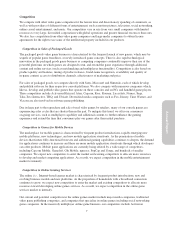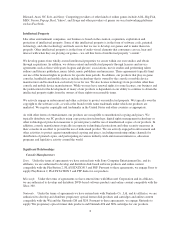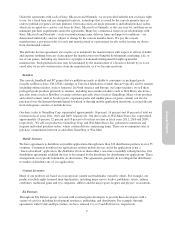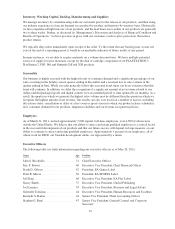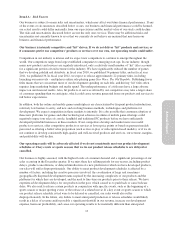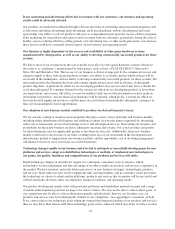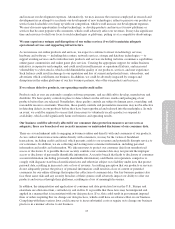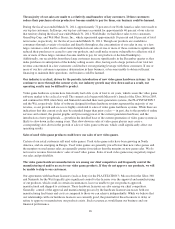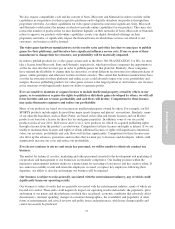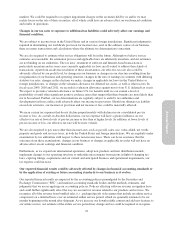Electronic Arts 2011 Annual Report Download - page 93
Download and view the complete annual report
Please find page 93 of the 2011 Electronic Arts annual report below. You can navigate through the pages in the report by either clicking on the pages listed below, or by using the keyword search tool below to find specific information within the annual report.
Annual Report
We also require compatibility code and the consent of Sony, Microsoft and Nintendo in order to include online
capabilities in our products for their respective platforms and to digitally distribute our products through their
proprietary networks. As online capabilities for video game systems become more significant, Sony, Microsoft
and Nintendo could restrict the manner in which we provide online capabilities for our products. They may also
restrict the number of products that we may distribute digitally on their networks. If Sony, Microsoft or Nintendo
refuse to approve our products with online capabilities, restrict our digital download offerings on their
proprietary networks, or significantly impact the financial terms on which these services are offered to our
customers, our business could be harmed.
The video game hardware manufacturers set the royalty rates and other fees that we must pay to publish
games for their platforms, and therefore have significant influence on our costs. If one or more of these
manufacturers change their fee structure, our profitability will be materially impacted.
In order to publish products for a video game system such as the Xbox 360, PLAYSTATION 3 or Wii, we must
take a license from Microsoft, Sony and Nintendo, respectively, which gives these companies the opportunity to
set the fee structure that we must pay in order to publish games for that platform. Similarly, these companies
have retained the flexibility to change their fee structures, or adopt different fee structures for online purchases of
games, online gameplay and other new features for their consoles. The control that hardware manufacturers have
over the fee structures for their platforms and online access could adversely impact our costs, profitability and
margins. Because publishing products for video game systems is the largest portion of our business, any increase
in fee structures would significantly harm our ability to generate profits.
If we are unable to maintain or acquire licenses to include intellectual property owned by others in our
games, or to maintain or acquire the rights to publish or distribute games developed by others, we will sell
fewer hit titles and our revenue, profitability and cash flows will decline. Competition for these licenses
may make them more expensive and reduce our profitability.
Many of our products are based on or incorporate intellectual property owned by others. For example, our EA
SPORTS products include rights licensed from major sports leagues and players’ associations. Similarly, many
of our other hit franchises, such as Harry Potter, are based on key film and literary licenses and our Hasbro
products are based on a license for these key toy and game properties. In addition, some of our successful
products in fiscal year 2011, Bulletstorm and Crysis 2, were products for which we acquired publishing rights
through a license from the product’s creator/owner. Competition for these licenses and rights is intense. If we are
unable to maintain these licenses and rights or obtain additional licenses or rights with significant commercial
value, our revenues, profitability and cash flows will decline significantly. Competition for these licenses may
also drive up the advances, guarantees and royalties that we must pay to licensors and developers, which could
significantly increase our costs and reduce our profitability.
If we do not continue to attract and retain key personnel, we will be unable to effectively conduct our
business.
The market for technical, creative, marketing and other personnel essential to the development and marketing of
our products and management of our businesses is extremely competitive. Our leading position within the
interactive entertainment industry makes us a prime target for recruiting of executives and key creative talent. If
we cannot successfully recruit and retain the employees we need, or replace key employees following their
departure, our ability to develop and manage our business will be impaired.
Our business is subject to risks generally associated with the entertainment industry, any of which could
significantly harm our operating results.
Our business is subject to risks that are generally associated with the entertainment industry, many of which are
beyond our control. These risks could negatively impact our operating results and include: the popularity, price
and timing of our games and the platforms on which they are played; economic conditions that adversely affect
discretionary consumer spending; changes in consumer demographics; the availability and popularity of other
forms of entertainment; and critical reviews and public tastes and preferences, which may change rapidly and
cannot necessarily be predicted.
17


